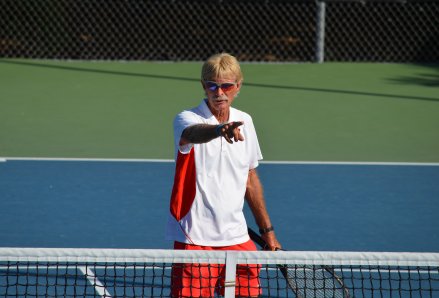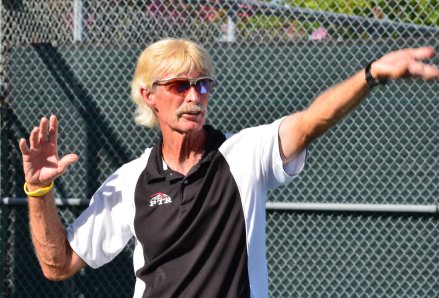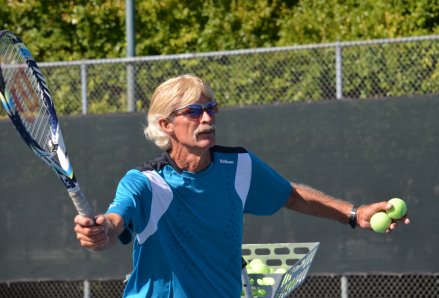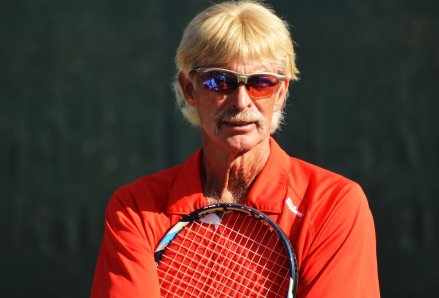 |
| |
 Highlights Highlights |
 |
-
Coaching style
* Consider the athletic skills of the player
* Offer simple concepts that players can understand
* Introduce skills that are just like related skills players already use
* Teach in large groups with individual attention to each player.
-
Speaking Engagements
* I have spoken at to coaches and pros at the Australian Open, US Open and at events in china, Canada, Mexico and Japan.
* I have 8 DVD's out on drills, games and mental toughness training
* I write extensively Tennis Magazine, Addvantage Magazine, TennisPro Magazine, TennisView Magazine, RSI Magazine and various tennis websites.
-
specialization
* Large Group instruction - games and drills that help to teach and re-enforce skills in the thrill of competition
* Identifying the true errors in a players game and not just the symptoms
* Creative drills that make learning a progression and fun
* Simple formulas that people relate to quickly to understand how to produce a stroke, change a stroke or how to implement a strategy or tactic based upon a players ability level.
I love the game of tennis; I have over 2,000 books on tennis and about the same number of antique tennis racquets. My son is a junior player and my wife enjoys recreational tennis.
-
Achievements
* USPTA Master Professional and PTR Master Professional - the first in the world to become a Master Professional in both organizations.
* USA High Performance Coach.
* Cardio Tennis National Speaker Team Member.
* Wilson Racquet Sports Premier Advisory Staff Speaker.
* On the education committee of both the USPTA and PTR.
* USRSA professional stringer with the United States Racquet Stringer Association for close to 20 years.
*Member of the USTWA -United States Tennis Writers Association.
* 3 time USPTA National Career Development Award Winner.
* 2 time National PTR Pro of the Year.
* 4 time USPTA Divisional Pro of the Year.
|
 |
|
Ken DeHart: The Man. The Mission. The Master.
Interview with Jason Lampoine
-
Q. I see on your LinkedIn bio that you've served as Executive Director for the USPTR (United States Professional Tennis Registry) back in the early 80's. What was that experience like? How did your position and role help you shape the organization?
A. I interviewed for the position with Pat and Dennis Van der Meer as the first full time ED on Hilton Head, Is. My goal was to provide quality service to the pros in the organization, grow the position and grow the PTR membership. I liked the competition that two organization encouraged to better service the tennis teaching professional. It was fun coming in on the ground floor to establish a baseline for the postition and the direction for the future.
-
Q. In addition, you've also attained a certification level of Master Professional and International Master Professional during your career. How did you find the continuing coach education throughout your development? Did you specialize in a particular pathway?
A. Attaining Master Professional was never a goal. Improving my own education was my goal and challenging myself to grow in areas where I was not proficient kept me motivated. When I first started teaching I knew little about strokes - so I started offering strokes classes. Next I realized I knew little about strategy - so I offered special classes on strategy. Next I realized I need to know more about mental tuffness - so I started offering Defeating the Monsters in your Mind courses. Each of the areas I knew I had to grow in so it forced me out of my comfort zone. I always attended every continuing education course I could. I only missed 1 USPTA World Conference since 1978 and I have made every PTR Symposium since getting certified in 1976. I never really specialized as I wanted to be a more complete tennis pro.
-
Q. You've also created content for coaches like " Error detection and Corrective Techniques for tennis pros, players and coaches - on DVD - "Corrective Techniques and Myth Busting", and "Best of Ken" is a collection of the most requested tips, drills & games from my travels around the world. It is a common sense approach to teaching and playing tennis for all levels of coaches, players and pros. Can you tell us more about each of the ones you've created?
A. Error detection is tricky - the true error is not the one you see but the move before that final move that creates the error. The dvd shows typical errors and simple ways to correct the true cause of the error. When I conduct the PTR Adult Certification course, the error detection part of the test is always the most challenging for the pros to pick out the error then come up with a simple solution. It also deals with myths about coaching and strategy that make the game confusing for players and coaches with examples and corrections. Best of Ken is the most comprehensive one that covers most all aspects of teaching and playing the game along with drills and games for all levels and types of games.
-
Q. You have also been the Director of Tennis for the San Jose Swim and Racquet Club in San Jose, California. How did your extensive background and experience help shape the organizations bottom-line? What challenges did you first face in your role and how did you overcome them?
A. I have been most fortunate in my teaching career. 13 years in Nashville, 3 years in Hilton Head, 10 Years in Phoenix, 1 year in Atlanta, 1 year at the Beverly Hills Country Club and the last 18 years here in NorCal. My experiences at each location has been with a variety of clubs - commercial, country club, private clubs and parks. I have always been a Director of Tennis since my very first job so I have had to adjust to budgeting, staffing and programming. I increased memberships at each club and revenue at each club as well. My last year at SJSRC we grossed about 300,000 on 3 courts. I have been the Director of Tennis at Almaden Valley Athletic Club in San Jose the last 3 years and have increased tennis memberships, revenue and programming. The challenges of going to a new club is as you turn programs around there are growing pains from members who now having to deal with less court time available as programs and instruction consume more court time. Another is developing trusting relationships and respecting their comfort level as they adjust to their new pros.
-
Q. As a Tennis Director, what specific advice would you share with those coaches who aspire to be better in their respective profession?
A. Continue to attend continuing education courses - on line or at conferences. Find a mentor who can help you avoid mistakes and have a clearer pathway to your future. Stay in touch with those who have the skills you wish to acquire - you be the one to make the effort not them. How can coaches collectively impact their local community and inspire the children and adults we teach to participate in the sport more? Have a local tennis pro association, be on the board of local tennis associations. Volunteer to help out at local high schools, fund raisers and schedule parent - pro meetings to keep both parties on the same page - a road map to their success.
-
Q. What is your opinion on the current state of Player Development here in the US versus that of other countries like Spain or South America? Do you feel that we've fallen behind the curve with regard to teaching methodologies and training techniques over the last 10 years?
A. There have been few associations that produce champions - as explained by Wayne Bryan and others. Taking a player away from a local pro who has developed a personal relationship with the player and putting them with a new pro without a history with the student seldom produces a champion. The key is developing a team training concept much like the other associations have where the players train and travel together. Making tennis a team concept give players a support system that is emotionally supportive which is key to surviving the stressful life of pro tennis. I would challenge who is chosen to work with the players -are we really getting the leaders in each area or just former players with little teaching and mentoring skills.
-
Q. Tell us about your playing background, at what level have you competed and do you still play competitively on a local or national level?
A. I started playing in college and have competed all my life. I have been ranked in the top 5 in each age group as a USPTA and PTR pros since I turned 30. I have won the Huntsman World Senior Games in the 50 and 55 singles, bronze medal in the Nike World Senior Games, gold medal in the Bay Area Senior games in NorCal. I have played limited USTA leagues because of my teaching and management schedule. I love the game and still love to compete. My son is 14 and plays tournaments and I enjoy playing with him as well.
-
Q. Your current role and position is Tennis Director with Alamden Valley Athletic Club in California. How do you find this position compared to your previous Tennis Directorship at San Jose?
A. The AVAC position is much larger with 11 courts and many departments and a much larger staff. I respond to a bottom line budget that I did not have at SJSRC. I manage 5 people in the office, 7 or more pros on court, a large USTA league program, active Jr Team Tennis program with league play. At San Jose we did not have a budet line or office staff. There are weekly staff meetings with all the department heads, annual management retreats for goal setting and staff evaluations.
-
Q. What players have you coached in the past and do you continue to be active with the USTA on a broader scale? If so, in what capacity?
A. I have coached many players who have gone on to play high school or DI -DII or DIII college tennis. It is neat to get Facebook or emails back from all of the students that tell you what an impact you had on their lives as players, adults and parents. I support all the USTA programs an received an award in Nor Cal for my contribution to all level and cultures. My schedule as Director does not allow me to participate on a board but I am a big believe in the efforts of the Tennis Industry Association's.
-
Q. You certainly have an extensive background, Ken! Where do you see yourself in the next 5 too 10 years within the industry?
A. I have been fortunate to have had some experience in most all aspects of the game at some point. I have plan on continuing to teach until about age 80 and attend as many education seminars as possible. I enjoy mentoring coaches and pros coming into the game, writing for tennis magazines, websites, speaking at seminars and traveling around the world. What roles or positions would be of interest to you? Training other pros at all levels. I live a mile from AVAC where I teach, my wife is a community theater actress and my son goes to school a mile from our house. So, I am not in a hurry to go to a new location. I enjoy creating dvd's, motivating others and being creative. I have a passion for the game that goes beyond teaching - I have over 2,000 old racquets, every Tennis Mag, Tennis Industry Mag, TennisView, Addvantage and TennisPro Mag in plastic sleeves in notebooks in my collection. I also have a large collection of tennis memorabilia that covers most aspects fo the game. In addition my book collection is over 2,000 books - most all I have read.
-
Q. Have you lectured on subjects with relation to our sport?
A. I have been a speaker at the Australian Open, National Tennis Teachers Conference, taught in China, Italy, Germany, England, Canada and Mexico. Topics range from "Unusual Doubles Formation", "7 Habits of Highly Successful Tennis Pros" "100 Drills in an Hour" "Defeating the Monsters in Your Mind" "Getting what you ask for- Communicating with Specifics" and over 50 other topics. If so, can you tell us more about the subjects you've covered and with what organizations? I have worked with the USTA, USPTA, PTR, TIA and most USPTA Divisions and several foreign organizations.
-
Q. You have a platform called "Ken DeHart Tennis" can you tell us more about it and the information you share with the public who visit the site?
A. There are over 20 free video tennis tips on my website and access to lots of free written articles and tips. I have a large collection of handouts that I freely give to students and pros. There is 101 Tennis Tips, Defeating the Monsters in Your Mind, 3 Secrets of Doubles, Designing Practices for Performance - about a hundred hand out articles for students and pros.
-
Q. In conclusion, what would you like to share with our audience about your passion for the sport and the numerous coaches, directors and managers who might read our interview?
A. Passion and persistence pays off if you love what you do. You only grow stronger in the face of challenges that push you out of your comfort zone. How can you not love getting dressed in tennis clothes to go to work in the sunshine and people who love to learn come to be your friend.
|
 |
|
 |
 Current Location Current Location |
 |
SCV CC
|
Silver Creek Valley Country Club
5460 Country CLub Pkwy
San Jose CA 95124
(408)892-3806
kendehart@aol.com
|
|
|
| |
 Background Background |
 |
Formative years
Tennis has been my passion since I first saw it played when I was a freshman in Kentucky at Campbellsville College.
I was running cross country to stay in shape for basketball when I saw my first tennis played on the 6 courts at Campbellsville.
I immediately went to K-mart and bought my first racket - Wilson for $14.95 and a can of Wilson tennis balls - $2.99 and went to find a wall and someone to play with. I was hooked. Summer school allowed me to play more tennis and my sophomore year I asked the coach if I could join the team. Her response, "Sure, you can help pick up balls and hit around with the players". I did indeed - couldn't beat anyone except my college roommate and that was a close match as well. Pick up balls, hit on the ball machine, hit with any of the team that could not find someone else to hit with, hit with anyone who had a racquet and play some more. I traveled with both the men and ladies teams to matches and would ride in the front seat of the car with the coach to listen to her talk about tennis. My junior year I played # 3 singles and won the KIAC Conference doubles championship at # 3 doubles. My senior year, I played #2 singles and was co-MVP of the year. I went to graduate school at Western Kentucky and was able to pay for my Masters degree by teaching tennis and other sports on a graduate assistantship
As a Coach
I have played and taught tennis for most of my life since the age of 19. I have been able to travel around the USA and the world to learn for the best coaches and to offer training to over 4,000 coaches and pros.
I received an opportunity to become a full time tennis pro and move to Nashville, Tennessee to become Director of Tennis for Sequoia Swim & Tennis for 2 years. I then became Director of Tennis for Woodmont Country Club for 5 years and Director for the largest club in Nashville - Maryland Farms Racquet and Country Club for 5 years.
Realizing I need more administrative experience, I moved to Hilton Head, South Carolina to become the Executive Director of the Professional Tennis Registry for over 2 years. Director of Tennis for Sea Pines Resort on Hilton Head Island with 30 courts became my next Director of Tennis position.
My parents had moved to Phoenix, Arizona and I interviewed for a position there and became the Director of Tennis for the largest club in Phoenix - the Western Reserve Club. We had 31 courts and the largest tennis program in the Southwest for 10 years. Later the owner and his wife divorced and he sold the club to CONDO development.
I was able to be hired in Atlanta, GA as Director of Tennis at the Sporting Club at Windy Hills, a $20 million dollar facility. After a year in Atlanta, I had an opportunity to become the Director of Tennis at Beverly Hills Country Club and move to LA. Here I would meet my wife - Karen and after a year there, we moved to San Jose where I have spent the last 15 years as Director of Tennis at Los Gatos, Mission Hill, San Jose Swim & Racquet Club (10 years), AVAC and now Silver Creek Valley Country Club with an incredible tennis staff and management team.
While this may sound like a lot of moving around the country, each move has been a positive career move and most have been for 5 years or more and 2 have been for 10 years or more - I have just been in the game for a long time.
All these opportunities have provided me with insights into how the game has changed, how it is taught and how to motive players and how to build a program.
As a Player
Because I still compete nationally, I have empathy for how it feels to experience the pressure of match play. I understand not be able to execute skills you know you have when you want them, how to rejoice in winning but rebound and learn from my losses.
I have been a gold medal winner in the World Senior Games, the Bay Area Senior Games and a silver medalist in the Nike World Senior Games. My ranking for the teaching pros has been in the top 5 since my 30's in either the USPTA or PTR with national championships in both singles and doubles.
|
 |
|
 |







